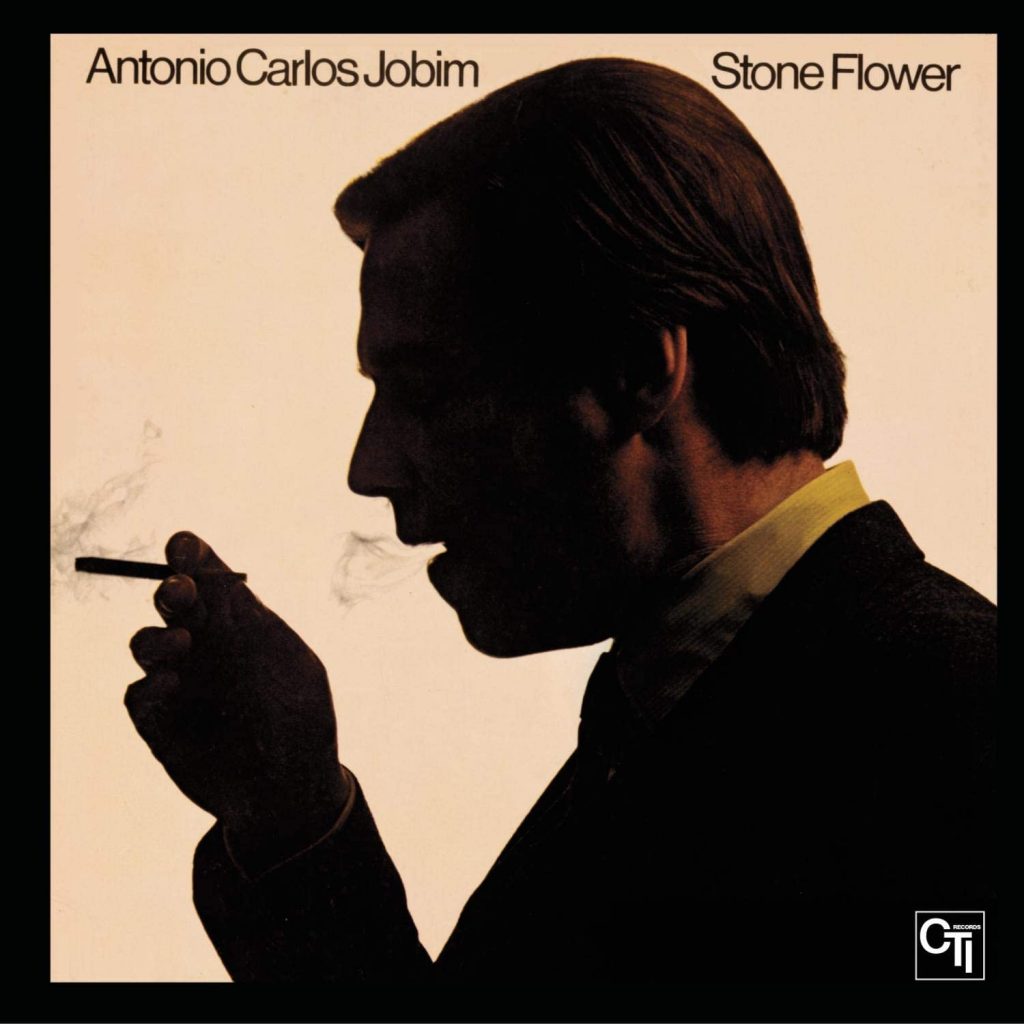

The sixth disc (or seventh, if you include Love Strings and Jobim) in his discography and my Tom Jobim survey, Stone Flower follows Wave and Tide , both chronologically, and in being an RVG production.
Benefitting from much the same team of personnel as Tide – Ron Carter, João Palmer, Airto, Everaldo Ferreira – and with the same kind of production aesthetic, it’s another solid slice of Jobim’s musical magic. One difference, however, is that Eumir Deodato handles the arrangements (he’s also credited with guitar; I didn’t know he played!?).
As usual with these recordings the horns are top drawer American jazzers. For these sessions we have the very mellifluous tones of Urbie Green, on ‘bone, Hubert Laws handling flutey duties, and Joe Farrell playing sop’ sax (the latter on just the one track).
The album begins with the enchantingly charming, Tereza, My Love (a title with a nice personal resonance for me!). Children’s Games sounds like an early rendition of Chovenda Na Roseira, or Double Rainbow, a really terrific tune. It’s slightly unusual in being in 3/4 time, and, whilst still having the signature mellowness of practically all Jobim’s music, it gets quite percussively energetic, with the drums in particular very active.
Jobim is mostly at the piano on these recordings, and plays superbly. Choro begins with the ensemble stripped back to the core rhythm section, and has a terrific main theme on keys, lithe yet muscular, minimal yet rich.
Track four is a rare thing, as Jobim plays someone else’s material. And he chooses Ary Barosso’s classic Brazil. It’s the first vocal on the album. And he plays electric piano. The quality of musicianship is just sublime. Joao Palma, Airto Moreira and Everaldo Ferreira working together extraordinarily well, and Ron Carter’s richly articulate bass completing the spare rhythm section as perfectly as is conceivable.
Brazil is just incredible. An ‘opus de samba’ of truly epic proportions. Managing to perfectly balance exuberant energy against a light melodic touch. The percussionists do a tremendous job, acting like a taught trampoline over which Carter and Jobim can bounce, in a beautifully sustained meditation on the chordal and melodic themes.
I’m not surprised that another take is added as a bonus track, as these guys are on fire! And Rudy Van Gelder’s recording captures it all as no one else could. One even hears Jobim’s cigarette and cigar soused breathing over the keys occasionally. This is music that is truly alive with energy and feeling.
As an aside, my first taste of any of the music from this disc actually came via Santana’s cover of Stone Flower, on their fantastic Caravanserai album, from 1972.* Jobim’s version is terrific, featuring segments in which violinist Harry Lookofsky at one point takes the melody, and at others Jobim scats a bit.
The second half of the album features numerous less well known Jobim tracks, such as the remarkably beautiful Amparo, a gently melancholic chamber orchestra style number, sans rhythm section. Utterly beautiful. And sounding very much like it could be a TV or movie theme piece.
Speaking of which, after the rhythm section returns for the stately Andorhina, we are treated to God And The Devil In The Land Of The Sun, which is a soundtrack to a film of the same name. Musically it sounds like a rehash of another Jobim track, but adapted somewhat, inserting a sax solo by Farrell, and some moody orchestral arrangements.
The album originally ended with a vocal version of Sabia, a middling Jobim track. By which I mean not amongst his most covered, nor his most obscure. Tom’s vocals are a bit approximate, pitch-wise. This is a pity, but the album overall is so good it can take it.
The CD reissue I have appends an alternate take of Brazil. Another fabulous and totally essential Jobim album.
*Santana’s drummer, Michael Shrieve, wrote some English lyrics, of a rather hippy-dippy nature. Perhaps not altogether surprisingly, as he was tripping on LSD when he penned them!
